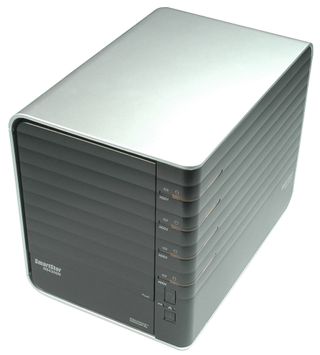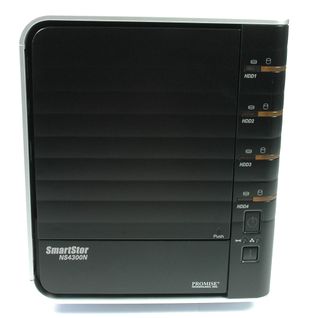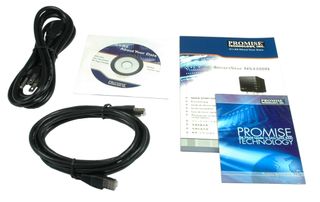Promise NS4300N: NAS For Small Offices
Promise NS4300N

The Promise NS4300N is supplied without hard drives. Online, this NAS housing can be ordered for a price of around $420. When compared to other NAS units with a similar range of functions, this price should be considered comparable.
The NS4300N has four drive bays--the build your own device (BYOD) concept means that users can fit the NAS housing with the storage capacity that meets their specific requirements. The current maximum is 6 TB, made up of four 1.5 TB drives available from Seagate.
Construction

The construction of the NS4300N is good, although the unit does leave room for the opposite impression when unpacked for the first time. The entire housing is made up of a light, thin plastic, which is not very reassuring at first glance. If you compare it to other NAS units, like the QNAP TS-409 Pro, for example, you immediately ask the obvious question: why would Promise want to give the NS4300N a plastic housing ?
If you look a little closer, you will see that the plastic housing is more stable and more accurately constructed than it first appears. The front flap used to cover the drive slots is fixed with a hinge to the left-hand side of the housing, and moves easily. If you are expecting creaks and squeaks, you will be pleasantly surprised.
The same goes for the drive holders, which are also made of plastic. Fears that these might break due to frequent use are unfounded. Inside the unit itself, a metal cage ensures that the drives are seated securely.


The Package
Stay on the Cutting Edge
Join the experts who read Tom's Hardware for the inside track on enthusiast PC tech news — and have for over 25 years. We'll send breaking news and in-depth reviews of CPUs, GPUs, AI, maker hardware and more straight to your inbox.

Promise includes the drive holders with associated screws, a network cable with rubber connector, an RJ-45 network cable, manual, and software CD.
Click an image to see more pictures of the NS4300N.
Current page: Promise NS4300N
Prev Page Increasing Floods Of Data Next Page Technical Data And Features-
ecka On the second page:Reply
The current maximum is 6 GB, made up of four 1.5 TB drives available from Seagate.
I think it should be 6TB -
chovav Can someone explain me why all of these NAS devices are delivering such poor performance over 1GBit LAN? they should be able to get to (more or less) 100MB/s in an uncomplicated raid 0 or such.. is the processor so slow that it can't handle it? not enough cache? what's going on?! :)Reply -
russofris Unfortunately, the article is as light on details of the internal components as Promises' so-called datasgeet at http://www.promise.com/upload/datasheet/NS4300NDatasheet_20080709.pdfReply
I would really like a thorough investigation of the internals, including the processor (it's a SoC, but which one), controller chip, and underlying OS. I suspect that it is a BSD derivative due to the lack of published source code available on the promise website, though "Billy" from the promise NAS focus group seemd to indicate that it was Linux using a special promise RAID technology (and not LVM or MDRAID)
There are multiple posts on the avsforums regarding the unit. Of the 25 or so pages that I read, I found that the unit is not a stellar performer, and can be purchased for around $300.
Ultimately, it looks as if you're better off purchasing a full featured $200 Atom based platform, tossing in 4 disks, and utilizing linux LVM/MDRAID for a full fledged NAS.
Frank -
Sad Panda Seriously? You want us to pay 420 bucks for a POS that will underperform a standard desktop machine you can put together on Newegg for less?Reply
MicroAtx MOBO with onboard video = $80
Dual Core CPU = $60
2 Gigs of DDR2 800 Ram = $24
Case with 6 HDD slots and 4 external slots = $40
Linux Operating System = $0
Total = $204 aka half the fucking price for more hard drive slots and much more customizable.
Seriously who buys this over-priced NAS shit. -
SilentBob999 Many NAS have poor power supply coming with, it will be a good idea to test with high consumption hard drive or at least talk about this fact... I heard about some NAS system of this type that come unstable with 4 1.5TB hard drive...Reply
For people who talking about the price, don't forget that its a Ready-To-Use solution, a lot of people want this type of gadget but doesn't have the technical knowledge require to setup a linux system able to share data over a network with an web interface for configuration.... -
@sad panda:Reply
So true... not to mention you'd still have enough left over to buy a real RAID card and absolutely blow these things out of the water.
4-port Hardware RAID cards going for under $300 on newegg. -
Sad Panda asdfzxc@sad panda:you'd still have enough left over to buy a real RAID card and absolutely blow these things out of the water.4-port Hardware RAID cards going for under $300 on newegg.Reply
What's wrong with getting a MOBO that does RAID for you?
-
FreeNAS on an ASUS + RAID board. Does all the protocols not just the three mentioned and FTP. Oh boy, hardly call that NAS-centric.Reply
For RAID10 to be worth the effort the minimum you should use is 3 pairs of hdd (didn't see RAID 10 as an option). 6 hdds with 50% redundancy. So if you were to use 2TB drives you would get a max of 6TB storage and 6TB of redundancy.
Want to run a heavy database driven application?
RAID 100 or plaid RAID would be the better one to go for. Many small businesses or startups do this. This product couldn't support that.
$420 can buy you a small form case with a number of designs that house many drive bays, mobo with onboard RAID, Graphics, multiple Gigabit ethernet adapters, good powersupply.
You can then go even further and utilise USB2.0 and throw external USB drives for another layer of data sharing.
All this and more and not stuck with a poorly put together product that limits the imagination because of its short comings.
All that and more from your local computer needs store.
-
chookman Im with you sad panda, i just don't get why people buy these when a cheap low power dedicated box is superior in every way.Reply
As for the additional card, a good hardware RAID card will give you a noticeable speed increase over any motherboard controller, provide more features and better security (failure wise). So if you needed speed and had the cash it would be better for sure.
Most Popular


